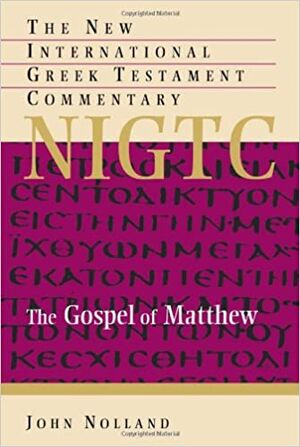The Gospel of Matthew ~ NIGTC (2005 Nolland), book
The Gospel of Matthew (2005) is a book by John Nolland.
Abstract
"A commentary on the Greek text."
"Having devoted the past ten years of his life to research for this major new work, John Nolland gives us a commentary on the Gospel of Matthew that engages with a notable range of Matthean scholarship and offers fresh interpretations of the dominant Gospel in the history of the church ... Nolland's work explores Matthew’s narrative technique and the inner logic of the unfolding text, giving full weight to the Jewish character of the book and its differences from Mark’s presentation of parallel material. While finding it unlikely that the apostle Matthew himself composed the book, Nolland does argue that Matthew’s Gospel reflects the historical ministry of Jesus with considerable accuracy, and he brings to the table new evidence for an early date of composition"--Publisher's description.
Editions
Published in Grand Rapids, MI: Eerdmans; and Bletchley: Paternoster Press, 2005 (New International Greek Testament Commentary).
Table of contents
Introduction. The authorship of the Gospel ; The Gospel's sources ; How the author handled his sources ; From eyewitnesses to Matthew's sources ; The date of the Gospel of Matthew ; The provenance of the Gospel of Matthew ; What kind of document did Matthew think he was writing? ; The state of the Gospel text ; Elements of Matthew's narrative technique ; Matthew's use of the OT ; Matthew's use of other Jewish tradition -- Commentary. The stock from which Jesus comes, and its history (1:1-17) ; Infancy (1:18-2:23) ; John proclaiming in the wilderness (3:1-12) ; Preparation (3:13-4:12) ; Establishing his ministry (4:13-25) ; Sermon on the Mount (5:1-8:1) ; Jesus on the move in ministry (8:[1]2-9:34) ; Workers for the harvest (9:35-11:1) ; Seeing clearly and relating rightly to God's present agenda (11:2-30) ; Conflict with the Pharisees (12:1-50) ; Parables of the kingdom (13:1-53) ; Jesus interpreted, but also rejected (13:53[54]-16:20) ; Anticipating a future through suffering and beyond (16:1-17:20) ; Status and behaviour in the 'royal family' (17:22-18:35) -- Family and possessions in view of the kingdom (19:1-20:16) ; Redefining greatness, Jesus goes to Jerusalem to die : Jericho, Bethphage, entry into Jerusalem (20:17-21:11) ; Provocative ministry in Jerusalem (21:12-46) ; Jesus silences the leaders who are his opponents (22:1-46) ; Jesus criticises the scribes and Pharisees (23:1-39) ; The shape of the future (24:1-25:46) ; The Passion account (26:1-27:66) ; Resurrection and commissioning (28:1-20).
External links
- [ Google Books]
